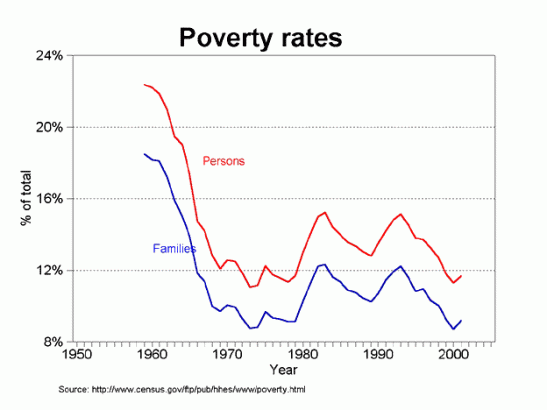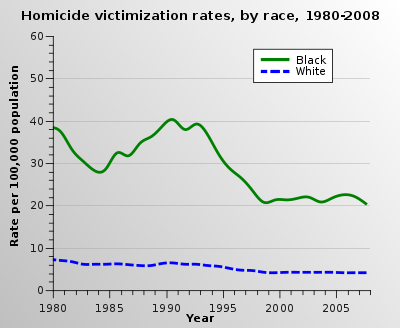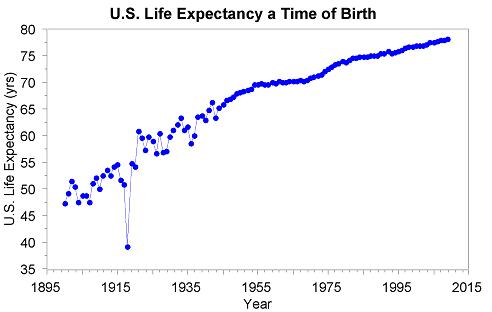if something, like, totally great happened, would sociology cover it?
Sociology is often seen, with some justification, as the discipline of muckrakers. If there’s racism or sexism out there, you bet sociologists will be on top of it. This has led people, including myself, to criticize the discipline for negativity bias. In a previous post, I even used the term “museum of dysfunction” to gently poke at our collective tendency to focus on the negative. Like most sociologists, including myself, would agree that social status is ever present in social life and it has bad effects, but can that insight be pushed too far?
To answer that question, I asked, how would the discipline of sociology respond to genuinely positive developments in American society? For example, how have sociologists responded to these genuinely positive developments in society?

- The decrease in the absolute poverty rate from about 23%% to 12%. Source: Reeve Vanneman’s Soc 441 web site/US Census data.

- The decrease in violent crime rates, such as homicide. Source: Wikpedia entry/US Bureau of Justice data.

- Life expectancy has increased over time. Source: Centers for Disease Control.
- The abolition of legalized discrimination against women and Blacks.
- The de-stigmatization and legalization of same-sex relationships.
You would think every introduction to sociology class would begin with “Hi, everyone, this is soc 101, the scientific study of society. In this class, I’ll tell you about how American society is moving in some great directions as well as some lingering problems.” You’d also think our journals would have articles like “Top 5 Ways Life Expectancy Increased in America” or “Fun fact: Everyone used to get murdered all over the place.” But somehow, I don’t think this is an accurate depiction of our discipline.
Of course, I’m being flippant. There are pockets of sociology that do focus on improvements in population averages rather than inequality studies. For example, there are some sociologists who focus on the origins of the industrial revolution, like Jack Goldstone. Within social movement research, there are actually a fair number of people who study who movements that generate positive outcomes, like the Civil Rights movement.
If sociology is truly a broad social science, and not just the study “social problems,” then we might encourage more research into the undeniably positive improvements in human well being.
++++++++
BUY THESE BOOKS!!
50+ chapters of grad skool advice goodness: Grad Skool Rulz ($4.44 – cheap!!!!)
A theory book you can understand!!! Theory for the Working Sociologist (discount code: ROJAS – 30% off!!)
The rise of Black Studies: From Black Power to Black Studies
Did Obama tank the antiwar movement? Party in the Street
Read Contexts Magazine– It’s Awesome!
Won’t happen. Inequality is our disciplinary brand. Don’t take my word for it: after briefly looking at the 9 most recent ASRs (Issue 3, and 2 from Issue 2), 7 are obviously about inequality. Two even, somewhat comically for this comment, have inequality in the title. A couple are about economic inequality, a few about gender inequality, one about racial inequality (again, just from the titles – there’s assuredly lots of nuance I’m not getting).
The two exceptions: (1) from a guy who has commented on this site recently expressing frustration with this very issue (and his coauthor), and (2) an exception that, in my eyes, proves the rule. Read the abstract for the “Axial Age” piece and tell me you recognize that as anything that “sociologists do.” And to be absolutely clear, I am not slagging that paper – I’m sure it’s really good (sincerely). It actually sounds really interesting, and I’m likely to read it for funsies even though it’s way outside of my area. Point is, let’s guess which papers of the 9 are going to have the most citations 10 years from now from within sociology. Anyone?
I’m not exactly complaining about all this. Inequality is really awful, and I wish that we could find ways to reduce it. I worry, though, that there is some truth to the critique that there is a normative stranglehold on the questions we ask and the ideas that are rewarded within our discipline. I also wonder who we are if not a “point-of-view” discipline?
LikeLiked by 3 people
anon
June 12, 2018 at 4:45 am
There is actually a ton of research on the crime decline. I suppose technically much of it, like Zimring’s “The Great Crime Decline,” gets taxonomically classified as criminology, but that doesn’t make it less sociological. For “real” sociologists, I would direct readers most notably to the work of Pat Sharkey (though Robert Samson’s work on immigration and crime is also useful). Sharkey and Michael Friedson even brought two of your examples together and measured the impact of the crime decline on life expectancy for Black men (see https://www.nytimes.com/2018/01/13/opinion/sunday/two-lessons-of-the-urban-crime-decline.html for a quick summary of that work).
LikeLike
Mikaila
June 12, 2018 at 4:16 pm
You’d think there are good methodological and normative reasons to focus on success, i.e., to understand which laws and policies helped overcome various social problems, you’d allow for some variation on the outcome variable when studying social problems. The idea that inequality has a “normative stranglehold” on sociology is well put. Why aren’t sociologists more interested (by way of two random examples) in the shape of the public sphere, or processes of political socialization? Are these topics less important than inequality? More ambitiously, what can sociology say about how “free” we are? Not in terms of formal rights but in social structural and cultural terms: do people have a subjective experience of being free? To what degree and why does this vary? It sounds cooky, but the study of freedom is the obvious complement to the study of equality. I search for “freedom” on the ASR webpage and nothing directly related appears.
LikeLiked by 2 people
balthazar
June 12, 2018 at 11:43 pm
Balthazar – that’s a great way of putting it. Like most sociologists, I am very happy that we do high quality research on inequality. I want it to continue and I want our presses and journals to continue publishing it. At the same time, the tilt is a bit on the extreme side. And I like your “duality” approach – whenever you have structure and inequality and constraint, you also have relief from those same constraints.
LikeLike
fabiorojas
June 13, 2018 at 2:37 pm
Relevant to this is Holmes’ “Sociology for Optimists” (2016). Holmes reviews the academic literature of nine topics showing, as a critically optimistic sociologist, how social change can sometimes be for the good. It specifically critiques the pessimism of sociologists. Rosling’s “Factfulness” (2018), while not sociological, shows plenty of world-wide progress, mostly in the last 15 years, and reveals how ignorant well-meaning professionals are of these recent developments. Enjoy these as your summer reading!
LikeLike
John Holley
June 13, 2018 at 7:13 pm
Mikaila is right about crime. There’s been a ton of work trying to account for the big decline over the last quarter-century. But what about the decline among kids in drugs, pregnancy, abortion, sex.i haven’t been paying attention. Have these received a similar amount of attention from sociological researchers?
LikeLike
Jay Livingston
June 15, 2018 at 12:01 am
I am not as well-read in demography, but I know there is an abundance of recent research on the decline in teen pregnancy & related outcomes. I would start with Kathryn Kost, a sociologist at the Guttmacher Institute.
LikeLike
Mikaila
June 15, 2018 at 12:24 am
fwiw social movement studies has a bias toward studying successful movements
LikeLiked by 1 person
olderwoman
June 15, 2018 at 5:25 pm
I agree with you there, OW. In studying oppressed groups, sociology oddly comes up with a strong track record of studying clear wins!
LikeLike
fabiorojas
June 15, 2018 at 5:26 pm
I hate to post on an old thread, but this just came to me. There’s a whole movement in psychology around this – positive psychology, the study of how people thrive. Perhaps, if people are interested in turning sociology in this direction, we should look there for a model. I’ll also mention solution-focused therapy as a model for an applied positive sociology. Lastly, it’s not quite as full-fledged, but there is a positive organizational studies center at Michigan.
LikeLiked by 1 person
jsradford
June 22, 2018 at 5:09 pm
jsradfor’d comment remind me of Erik Olin Wright’s campaign for utopian sociology, which was defined precisely that way: research on how to construct societies that promote human thriving.
LikeLike
olderwoman
June 24, 2018 at 2:04 pm